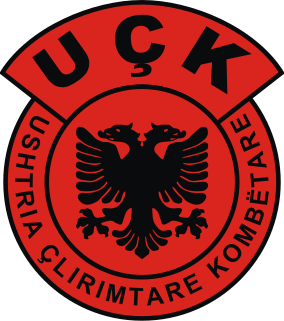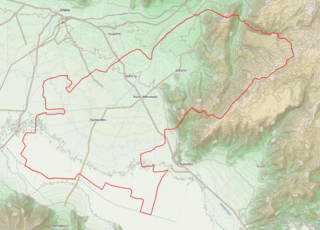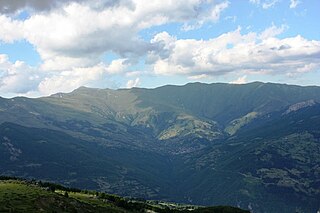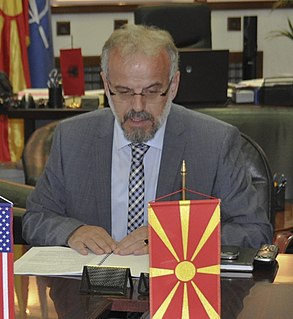
The Macedonian language is a South Slavic language spoken as a first language by around two million people, principally in North Macedonia and the Macedonian diaspora, with a smaller number of speakers throughout the transnational region of Macedonia. It is the official language of North Macedonia and a recognized minority language in parts of Albania, Romania, and Serbia.
Historical negationism or denialism is an illegitimate distortion of the historical record. It is often imprecisely or intentionally incorrectly referred to as historical revisionism, but that term also denotes a legitimate academic pursuit of re-interpretation of the historical record and questioning the accepted views.

The National Liberation Army, also known as the Macedonian UÇK, is a militant organization that operated in North Macedonia in 2001 and was closely associated with the Kosovo Liberation Army (KLA).

The Dasht-i-Leili massacre occurred in December 2001 during the U.S. invasion of Afghanistan when, depending on the sources, between several hundred to several thousand Taliban prisoners were shot and/or suffocated to death in metal shipping containers while being transferred by Junbish-i Milli soldiers under the supervision of forces loyal to General Rashid Dostum from Kunduz to Sheberghan prison in Afghanistan. The site of the graves is believed to be in the Dasht-e Leili desert just west of Sheberghan, in the Jowzjan Province. U.S. President Obama in 2009 ordered an investigation into the matter, which has yielded no (published) results.

The Macedonian Struggle or Greek Struggle in Macedonia was a series of social, political, cultural and military conflicts between Greek and Bulgarian subjects living in Ottoman Macedonia between 1893 and 1908. The conflict was part of a wider rebel war in which revolutionary organizations of Greeks, Bulgarians and Serbs all fought over Macedonia. Gradually the Greek & Bulgarian bands gained the upper hand, but the conflict was ended by the Young Turk Revolution in 1908.

Macedonia is a geographic and administrative region of Greece, in the southern Balkans. Macedonia is the largest and second-most-populous Greek region, with a population of 2.38 million in 2017. The region is highly mountainous, with most major urban centres such as Thessaloniki and Kavala being concentrated on its southern coastline. Together with Thrace, and sometimes also Thessaly and Epirus, it is part of Northern Greece. Greek Macedonia encompasses entirely the southern part of the region of Macedonia, making up 51% of the total area of the region. It also contains Mount Athos, an autonomous monastic region of Greece. Macedonia forms part of Greece's national frontier with three countries: Bulgaria to the north-east, the Republic of North Macedonia to the north, and Albania to the north-west.

Doxato is a town and municipality in the Drama regional unit, in East Macedonia and Thrace, Greece. The seat of the municipality is the town Kalampaki.

Bulgaria joined the European Union in 2007, its compliance with human rights norms, however, is far from perfect. Although the media have a record of unbiased reporting, Bulgaria’s lack of specific legislation protecting the media from state interference is a theoretical weakness. Conditions in Bulgaria’s twelve aging and overcrowded prisons generally are poor. A probate reform in mid-2005 was expected to relieve prison overcrowding.

The Macedonian Greek Catholic Church is a Byzantine Rite sui juris Eastern Catholic Church in full union with the Catholic Church which uses the Macedonian language in the liturgy.

The governments of the German Empire and Nazi Germany ordered, organized and condoned a substantial number of war crimes in World War I and World War II respectively. The most notable of these is the Holocaust in which millions of Jews, Poles, and Romani were systematically murdered or died from abuse and mistreatment. Millions also died as a result of other German actions in those two conflicts. The true number of victims may never be known, since much of the evidence was deliberately destroyed by the perpetrators in an attempt to conceal the crimes.

Law enforcement in North Macedonia is the responsibility of the Police of North Macedonia.

The Constitution of North Macedonia is a codified constitution outlining the country's system of government and basic human rights adopted in the Parliament of the Republic of Macedonia on November 17, 1991.

In North Macedonia, the most common religion is Orthodox Christianity, practiced by most of the ethnic Macedonians. The vast majority of the Orthodox Christians in the country belong to the Macedonian Orthodox Church, which declared autocephaly from the Serbian Orthodox Church in 1967.
This article discusses the phonological system of Standard Macedonian based on the Prilep-Bitola dialect. For discussion of other dialects, see Macedonian dialects. Macedonian possesses five vowels, one semivowel, three liquid consonants, three nasal stops, three pairs of fricatives, two pairs of affricates, a non-paired voiceless fricative, nine pairs of voiced and unvoiced consonants and four pairs of stops.

North Macedonia, officially the Republic of North Macedonia, is a country in the Balkan Peninsula in Southeast Europe. It is one of the successor states of the former Yugoslavia, from which it declared independence in September 1991 under the name Republic of Macedonia.

FK Sloga 1934 is a football club based in Vinica, Republic of Macedonia. They currently play in the Macedonian Third League.

The Vejce ambush occurred when militants of the NLA killed eight soldiers of the ARM, on the late afternoon of 28 April 2001 near Vejce, a village in the Šar Mountains, Macedonia. It represent the heaviest death toll for the government forces in a single incident during the Insurgency in the Republic of Macedonia.

Dejan Denkovski was a member of the Armed Forces in Macedonia. He was killed in action near the village of Aleshevce in 2001.

Talat Xhaferi is a Macedonian-Albanian politician and Speaker of the Parliament of North Macedonia. He was also the former Minister of Defense.
















